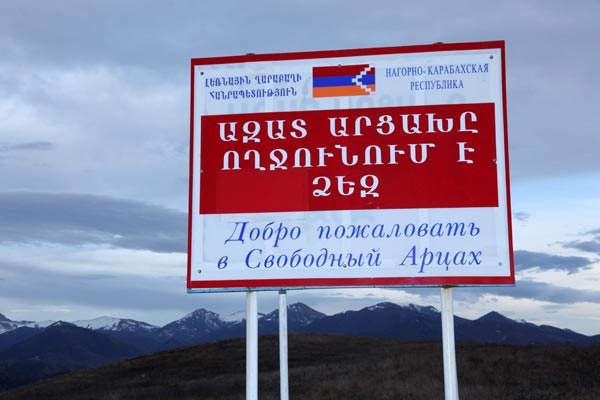By Alyssa Dermenjian
After the April 2-6 Azerbaijani attacks on the Nagorno-Karabagh Republic (Artsakh/NKR), which resulted in hundreds of lives lost and confirmed reports of Azerbaijani war crimes against both civilians and soldiers, the international community, and in particular the Organization for Security and Cooperation in Europe (OSCE) Minsk Group, charged with negotiating a lasting peace agreement since 1994, have stepped up efforts to negotiate a settlement.

The ‘Free Artsakh Welcomes You’ sign greets all who visit the independent Republic. The unilateral concessions envisaged in the “Madrid Principles” would fundamentally threaten that freedom, leaving Artsakh citizens vulnerable to renewed Azerbaijani aggression and undermining their right to self-determination.
There has been shuttle diplomacy organized by the OSCE Minsk Group countries—US, France and Russia –individually and as a group, with the Armenian and Azerbaijani Presidents meeting Secretary of State Kerry, State Secretary Desir and Foreign Minister Lavrov in Vienna in May, and with Russian President Putin in Saint Petersburg in June.
Various options have been floated, but the main peace plan on the table appears to be the “Madrid Principles,” first presented during a November 29, 2007, OSCE Minsk Group meeting with the Presidents of Armenia and Azerbaijan held in that city. The specific details of the plan have largely been kept secret. A purported text surfaced—strategically leaked, perhaps—after Azerbaijan’s April attack.
While we cannot authenticate that document, the broad outlines are now widely known.
The “Madrid Principles” call for the initial unilateral concession of seven regions of sovereign Artsakh land—Kubatli, Jebrail, Zangelan, Agdam, Fizuli, Kelbajar, and large portions of Lachin—five of which comprise the outer perimeter of Artsakh and serve as a direct line of contact between the military forces of the NKR and Azerbaijan. Artsakh would become—as it was during the Soviet era—an island surrounded by Azerbaijan, with a “corridor of agreed width” connecting it to Armenia in the Lachin area. The historically Armenian areas of Shahumyan, portions of Martakert and Martuni, and the village of Artsvashen would remain under Azerbaijani occupation. In return, at some point in the future, Artsakh’s final status would be determined by an unspecified “expression of will.” Along the way, there are promises of the deployment of international peacekeepers and donor conferences to promote economic development.
The plan is fundamentally flawed and reckless.
First, the irrevocable surrender of territories would lead to the lack of core security in Nagorno Karabakh, set the stage for continued conflict and increase the likelihood of regional instability. It would reward Azerbaijan for decades of ceasefire violations and attacks which have cost hundreds of lives. Worse, it would green-light further attacks by President Ilham Aliyev, who repeatedly threatens the military takeover not only of Artsakh but of the Republic of Armenia.
Second, the reference to an “expression of will” raises more questions than it answers. When would such a referendum (if that is what is envisioned) actually take place? With no clear end date, Baku could defer or postpone for many years or decades to come without any consequences or incentive for it to adhere to its word. Who would be asked or allowed to vote? Who would conduct the actual voting process? And finally, what would folks be asked to vote on: Artsakh’s broad autonomy within Azerbaijan? Artsakh’s independence? Would Artsakh’s reunification with Armenia even be an option?
Third, while peacekeepers may be deployed in good faith, their ability and willingness to protect Artsakh civilians is questionable at best. A 2014 United Nations internal has study found that “there is a persistent pattern of peacekeeping operations not intervening with force when civilians are under attack.” Specifically, “of the 507 incidents involving civilians reported in Secretary-General’s reports from 2010 to 2013, only 101, or 20 per cent, were reported to have attracted an immediate mission response. Conversely, missions did not report responding to 406 (80 per cent) of incidents where civilians were attacked.” Can we entrust the safety of Artsakh’s civilian population to a system that intervenes to stop the violence only 20% of the time?
And what about the Artsakh Republic itself? Why are they not at the negotiating table right now, participating in the discussions which would decide their fate? Karabagh was a signatory to the ceasefire back in 1994 and participated in early negotiations. If, in fact, a Karabagh deal is in the works, shouldn’t the Artsakh government be part of the talks?
The head of the NKR Public Council on Foreign Policy and Security said it best, in a 2014 interview with the Institute for War and Peace Reporting (IWPR).
“Armenian diplomats should have long ago rejected any discussion of a document [Madrid Principles] that not only contains many points that run counter to Armenian interests, but also has great destructive potential. It’s time to relieve the international mediators of their false ideas. This would allow them to create new regulatory mechanisms that reflect current realities.”
In other words, scrap the Madrid Principles and start working on a balanced plan which would respect the right to self-determination of the people of Artsakh and offer meaningful guarantees for their safety and security.
And now is a good time to start.
The Armenian National Committee of America (ANCA) has launched an action campaign to U.S. legislators outlining the dangers of the “Madrid Principles.” To take action, visit anca.org/Madrid.
Alyssa Dermenjian (California State University Northridge, Class of 2018) is a 2016 ANCA Leo Sarkisian Intern
Source: Armenian Weekly
Link: Time to Get Rid of the Madrid Principles
